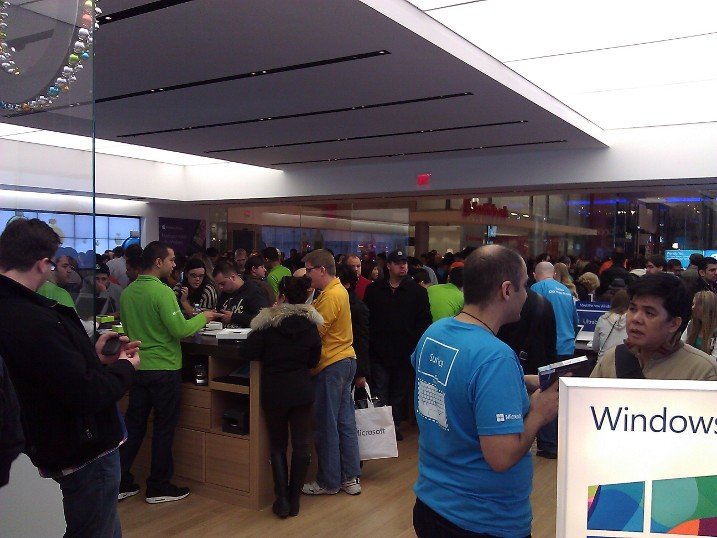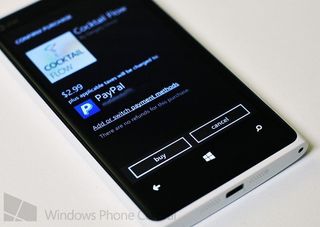Windows Phone team underline highlights from 2012

Todd Brix has published a new entry on the Windows Phone Developer Blog detailing highlights of 2012 for Windows Phone. The goal for the team was to establish a new, scalable platform on the mobile phone as well as the cloud. Providing a unique experience for consumers to enjoy when downloading and using apps from a catalogue of apps.
The Windows Phone team improved the foundations of app development and publication with a new client platform, developer toolset, Dev Center, more markets supported and more. But just how active are Windows Phone owners when it comes to downloading apps from the store? It's reported that on average Windows Phone users have downloaded 54 apps each.
The Consumer
The 54 apps downloaded are from 75,000 new apps and games (as well as 300,000 updates) that were published in 2012. To help improve confidence when browsing to store, Microsoft also added functionality for consumers to get in touch with the team should they have a concern about an app. The catalogue is growing steadily and more big-brand apps are being made available.
To further improve convenience, both app discovery and purchasing have been enhanced through a number of implementations. These include Bing-powered search and smart lists, collections and recommendations. More payment gateways have also been opened up to enable more options for consumers, including PayPal and Alipay. This is on top of carrier billing being enabled at more network providers.
Lastly for consumers are Live Tiles. A reported 85% of Windows Phone 8 consumers (based on customer feedback) would choose Live Apps over those which don't sport such functionality. So that's new options for developers and features for consumers covered, what else was pretty huge in 2012 for the platform?
Money makes the world go round, and unfortunately that's what increases developer interest in a platform - particularly those who wish to work a business and make a solid ROI. The shared core in Windows Phone 8 and Windows 8 significantly expands the opportunity for consumer reach and monetisation. Developer revenue is up 40% month-on-month in the month since the SDK was released.
We expect this to continue rising with in-app purchases, etc. All this comes leads to more apps heading to the platform, which is always a positive point for consumers.
Get the Windows Central Newsletter
All the latest news, reviews, and guides for Windows and Xbox diehards.

The Developer
As well as improving the experience of the consumer in Windows Phone 8, Microsoft also paid enough attention to developers - both are interlocked in some implementations applied (as mentioned above with developer revenue). The Windows Phone team has focused on innovation, customer reach and engagement, as well as monetisation.
The first point is accomplished by establishing a common UX design language, say hello to the new UI in Windows 8 and Windows Phone 8. This brings with it a set of shared APIs and a consistent toolset enabling developers to create unique, innovative experience. We've also witnessed the company pushing for more markets to be covered. This opened up new locations for both consumers and developers to access the store.
At the start of the year, the market count was at just 35 with Windows Phone 7, and is now at 191 with Windows Phone 8. That's quite an increase, 90% on what's now available to developers. With the new Developer Center and other enhancements, developers can engage with customer feedback and view better reporting.
As was mentioned above, Brix goes into developer monetisation. Supporting more business models, Microsoft implemented in-app purchase functionality. This adds to what's already available - in-app advertising, trial and paid options. Carrier billing is being offered by more network providers as Microsoft looks to continue pushing companies to offer such options for subscribers. Carrier billing itself is reportedly preferred by 75% of Windows Phone users who have access to the functionality.
It has been quite a year, and one to remember as the year when Windows Phone foundations were constructed. This puts the Windows Phone team in a strong position to continue pushing on with Windows 8 integration and new features being included in future platform updates.
What are your highlights of 2012 for the platform? Here's to an eventful 2013 for Windows Phone.
Source: Windows Phone Developer Blog

Rich Edmonds was formerly a Senior Editor of PC hardware at Windows Central, covering everything related to PC components and NAS. He's been involved in technology for more than a decade and knows a thing or two about the magic inside a PC chassis. You can follow him on Twitter at @RichEdmonds.